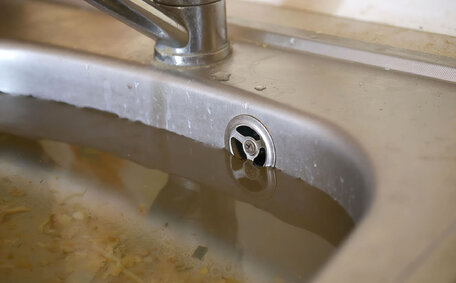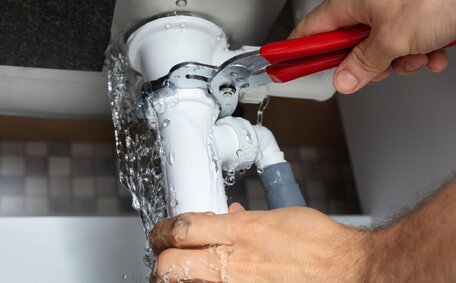Immediate actions to take if you smell gas
If you smell gas in your home, immediately evacuate everyone. If you detect the smell of gas inside your home, it’s crucial to act fast. Do not operate any electrical switches, as this could trigger an ignition.
Leave your exits slightly open, to let fresh air circulate the area as swiftly as possible while evacuating. Call the fire brigade on 000 and your gas distributor without delay.
Refrain from using open flames or smoking if you notice a gas smell to avoid ignition. Once at a safe distance, move upwind from the gas hazard to avoid inhaling noxious fumes.
Do not return inside until emergency services or a local gas professional have inspected and declared your property safe. Experts will pinpoint and fix the leak, which could involve your gas meter.
Avoiding ignition sources
Should you smell gas in your dwelling, it’s imperative to avoid ignition sources and seek immediate assistance. Avoid anything that could produce a spark or flame; gas safety measures must be engaged immediately due to the explosive risks of a leak.
Specifically, do not smoke, ignite any candles or incense, or turn off all electrical devices or appliances, therefore, do not use or come near from all sources of open flames. Refrain from using vehicles, garage door openers, power tools, or mobile phones by the leak. Even a minor spark from these devices can ignite gas mixtures, indicating a possible nearby leak.
Likewise, do not switch on or off any lights or electrical devices. Ensure all potential ignition sources are kept away from the affected vicinity until emergency crews have contained the leak. Taking these safety precautions seriously can save lives, as gas leaks can cause severe explosions.
Getting a professional inspection
Once the initial gas leak has been addressed and emergency services confirm it’s safe to re-enter your home after gas leak issues, it’s crucial to have a licensed gas fitter perform a thorough inspection of your gas system.
A skilled professional should evaluate your gas appliances, including heaters, stoves, and hot water units, to ensure home safety. They will inspect gas pipes, connections and fittings to pinpoint the source of the leak or wear and tear that could cause leaks. Technicians use specialised equipment to detect and fix leaks that you may not notice.
An inspection helps to ensure your environment is safe before you resume using gas appliances. It also identifies potential risks early so they can be fixed before causing another dangerous situation. Always use qualified gas professionals registered with Gas Safe or similar industry bodies.
Checking gas appliances and fittings
Regular checks for signs of gas leakage are essential, with any unusual odour warranting a thorough inspection of all gas appliances, pipes, and fittings. Schedule annual inspections by a licenced gas technician to examine appliances like stoves, heaters and hot water systems. They’ll employ leak detection tools to meticulously examine all components for leaks.
Also watch for the following Indications of a gas leak may include:
- A hissing or whistling sound near an appliance or pipe
- Dirt or dust blowing from a pipe connection
- Bubbles forming in soap solution that has been applied to a pipe
- Browned or dead vegetation near an external pipe
- Pilot lights that frequently go out
- Flames coming from burners that are a different colour than normal
Should you notice these signs, or smell gas in your home, operate the gas shutoff valve and call your gas company immediately. Do not try to fix the leak yourself. Annual inspections and awareness of leak signs can help avoid hazardous situations.
Replacing damaged gas lines
If a gas leak investigation reveals damaged pipes or supply lines, a licenced gas fitter must be hired to replace them. Gas line repairs and replacements must adhere to strict industry regulations and safety standards.
In Newtown, Sydney, contact your local regulatory body, as all gas work requires certification and approval from the NSW Gas Safe regulator. Gas fitters must follow the requirements outlined in AS/NZS 5601 Gas Installations standards. Replacement parts must also meet the necessary compliance levels.
Customary steps take you through the process of swapping out a gas conduit:
- Evaluating damage and planning required materials/equipment
- Shutting off your main gas supply
- Purging existing gas from damaged lines
- Removing damaged section of pipe/fittings
- Replacing with new gas line piping meeting Australian standards
- Conducting thorough leak checks on new installation
- Reinstating the gas supply to your property and ensuring such components like your meter and all points are functioning
Gas line replacement can cost between AUD 2,000 to 4,000, depending on materials and job complexity. Priority must be restoring safety through compliant installation.
Installing safety devices
It’s prudent to be well-informed about the causes gas leaks and to install gas safety devices in your home to help prevent leaks or alert you if one occurs. Carbon monoxide detectors and natural gas detectors are two important devices to consider.
To prevent monoxide poisoning, carbon monoxide detectors should be installed near all sleeping areas and on every level of the home. They set off an alarm if dangerous carbon monoxide gas builds up, alerting you when gas leaks your home and giving you warning of a potential issue with a gas appliance or venting problem.
Natural gas detectors can also be placed around the home, especially near gas appliances or connections. They utilise detectors that sound alarms when minute quantities of gas linger around your living space. Some models integrate with smart home systems.
Whole home gas shut-off valves, which automatically cut off the supply if a gas leak is detected, are also valuable for risk mitigation. Automatic systems can prevent injuries, fatalities, and property loss from uncontrolled leaks, safeguarding your safety and home insurance claims.
While no device offers a guarantee, combining preventative maintenance, early leak detection through devices and emergency knowledge helps maximise home gas safety for your family.
Preventing future gas leaks
The most effective way to prevent gas incidents is through proactive maintenance and awareness. Schedule annual inspections of all gas appliances, pipes and fittings with a licensed gas technician. They can use specialised leak detection tools and should replace any ageing components.
Also be attentive to potential signs of leaks like unusual sounds from pipes, damaged fittings, or dead vegetation. Shut off the gas immediately if detected and call professional help. Make sure to use appliances properly by following operating guidelines and watch for deteriorating connectors or hoses.
Consider installing safety devices too like gas detectors, carbon monoxide alarms or automatic shutoff valves for extra protection. Also, avoid storing flammable substances near gas meters or appliances. Staying vigilant through inspections, maintenance and deploying safety measures will help minimise the risk of gas leaks in your home.
Conducting regular maintenance
Regular maintenance is crucial for ensuring the ongoing safety and longevity of gas systems in your home business. Homeowners and businesses should adopt a thorough gas inspection and service schedule.
Licenced technicians should check gas appliances like water heaters, stoves and room heaters annually. Tests include burner function, airflow, flue integrity, and pipe connections, offering solutions for various gas issues. Technicians will use specialised leak detection equipment to check all components if a gas leak is suspected.
Furthermore, subsurface gas pipes entering the property should be checked every two years. Technicians can check pipe integrity and may use pipe camera surveys to assess condition. Watch for warning signs like vegetation damage.
Other gas safety maintenance tips include:
- Replacing gas appliance flex connectors every 5 years
- Confirming adequate ventilation around gas appliances
- Checking appliance exhaust flues are clear of obstructions
- Inspecting gas cylinders and connections for damage
Property owners and body corporates have extra responsibilities for maintaining shared gas infrastructure. Proactively scheduling inspections and replacing old parts is crucial in averting leaks.
Being aware of leak signs
It’s critical to know what to do when i detect gas issues, safety-wise, when signs may indicate a gas leak.
If you notice a rotten egg scent, hissing sounds from pipes, or soil dispersing from a line, immediately turn off the gas. Also be alert to unusual appliance operation like flickering flames or frequent pilot light outages which could signify a leak.
Outdoors, if you smell gas, immediately prioritise your household’s safety and lookout for signs like bubbling puddles near gas lines, dead patches of vegetation, or unusual moisture on meters that could signal underground leaks. If you smell gas outside, stay away from electrical devices, avoid open flames, evacuate quickly, and immediately contact emergency services or our team. Knowing how to respond to gas leak signs, such as strange odours, noises, or damage, enables quick action.






